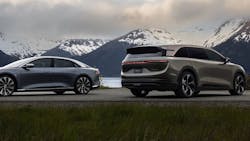EV Notes: Lucid’s New Factory and Polestar’s $200M Investment
With the summer in full swing, it’s easy to miss the latest from major EV companies. In this rundown, we’re touching on manufacturing, charging, and even monetary investments.
Lucid Expands Arizona Footprint
Just months after announcing it had purchased bankrupt start-up Nikola’s Arizona facilities, Lucid Group has cut the ribbon on its new (to them) Phoenix Hub facility.
According to a press release, the new facility, which officially opened on June 11, is part of a planned expansion in the state, adding more than 880,000 square feet to its Arizona footprint, which now totals nearly four million square feet. The new site comes with development equipment, including battery testing chambers, a full-size chassis dynamometer, machining equipment, and more.
“These new facilities provide Lucid with immediate and substantial capacity for advanced manufacturing activities, as well as developing product innovations and testing components and systems,” said Adrian Price, Senior Vice President of Operations at Lucid. This creates a powerful, integrated ecosystem with our existing manufacturing facility in Casa Grande. We're thrilled to add these facilities, expand our Arizona footprint, and further grow our talented team at Lucid.”
The site, in conjunction with its Coolidge location, is expected to support the Casa Grande factory as Lucid prepares to launch a mid-size vehicle platform. As part of Lucid’s planned expansion, the company aims to add as many as 500 new jobs in Phoenix over the next five years.
QuantumScape’s EV Battery Breakthrough
Solid-state batteries have long been touted as the successor to lithium-ion ones due to their potential to allow faster charging, better safety, and greater energy density. However, producing them on a commercial scale has been a challenge, until now.
Battery producer QuantumScape announced June 25 that it had fully adopted its Cobra ceramic separator on its manufacturing lines. In a battery, the separator keeps the anode and cathode separate, allowing ions to flow between the two when the battery is charging or discharging. QuantumScape’s Cobra approach allows this process to happen 25 times faster and with less equipment than other methods. The technology has been validated in lab-scale development, but a successful shift to large-scale production could make the ceramic separator the foundation of EV batteries going forward. Volkswagen, which owns 24% of QuantumScape, already plans to use the tech in mass production.
Polestar Lands $200M Equity Investment
Polestar Automotive Holdings has received a $200 million equity investment from PSD Investment Limited, one of its existing investors. PSD is controlled by Shufu Li, the founder and Chairman of Geely Holding Group, which is also the majority owner of Polestar.
Under the agreement, Polestar will sell 190,476,190 Class A American Depositary Shares to PSD Investment for the aforementioned $200 million, at a price of $1.05 per share. Polestar intends to use the proceeds for working capital requirements and general corporate purposes.
Wallbox Builds On Ensol Partnership
EV charging company Wallbox announced it will expand its partnership with Ensol EV, the e-mobility division of Energy Ensol Solutions. Collaboration between the two first began when Ensol EV began installing Wallbox’s Pulsar line of AC chargers at residential and commercial sites.
The new phase will include deployment of Wallbox’s Supernova DC fast chargers at urban centers and transit corridors across Texas, Georgia, and Florida. The companies identified the three states as “experiencing rapid growth in EV adoption and charging demand.”
Ensol EV also plans to integrate solar and battery storage capabilities onto the Supernova chargers.
"Our goal is to build charging infrastructure that not only enables electric mobility but is rooted in sustainability as the core of the entire concept," said Ernesto Figueroa, ENSOL EV CEO. He also characterized the Supernova line, which can provide up to 180 kW of power and includes integrated smart charging features, as the “perfect fit” for the company’s projects.
Initial installations are scheduled to begin in the second half of the year, with additional sites following in early 2026.
